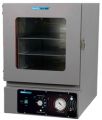Tips for choosing a reliable Vacuum Desiccator

The Vacuum Desiccator is an essential piece of equipment for laboratories. Vacuum Desiccators are cold chambers for drying small quantities of material that may perish under high temperatures. It is also ideal for drying liquids and solid materials such as salts or sugars for later use in chemical experiments where precise measurements are required without contamination from water vapour or other growths from moisture in the air. This article will describe some considerations when choosing the best vacuum desiccator and introduce a specific model.
What is Vacuum Desiccator?
The Vacuum Desiccator is an essential piece of laboratory equipment which provides a controlled environment to dry small quantities of material that may perish if dried at higher temperatures. Such material includes salts or sugars, for example, which are used in chemical reactions requiring specific measurements without contamination from water vapour or other growths from moisture in the air.
The construction materials should be able to withstand the high temperatures encountered during the vacuum process. Users should use stainless steel and glass for most products as these materials have excellent properties of resistance to corrosion at high temperatures and are stable under cold conditions. Similarly, suitable rubberized gaskets ensure an airtight seal when using a vacuum desiccator.
Types of Vacuum Desiccator:
There are different types of Vacuum Desiccator at Global Lab Supply, such as personal vacuum desiccators, laboratory vacuum desiccators and rotary vacuum desiccators.
1. Personal Vacuum Desiccator:
Personal vacuum desiccators typically range from 1 litre to 5 litres. Personal sizes are suitable for individual use, but if more space is required, a one-litre size will be too small, and a five-litre size may be too big for the worker on their own in a laboratory.
2. Laboratory Vacuum Desiccators:
Laboratory Vacuum Desiccators vary in size according to their uses. Many have sizes ranging from 25 litres up to 400 litres. Laboratory vacuum desiccators are ideal for researchers looking to dry large amounts of materials.
3. Rotary Vacuum Desiccators:
Some Vacuum Desiccators are sold as rotary vacuum desiccators; these units typically use a water bath to remove heat and provide vertical space for larger quantities of material during the process. This type of vacuum desiccator can be helpful in situations where large pieces of equipment need to be preserved and dried quickly, as water reduces the drying temperature by approximately 15˚C per each 20cm depth, consequently speeding up the process.
Size and Style:
Vacuum desiccants come in many shapes and sizes, varying according to the laboratory application or personal needs. In addition, the manufacturing of Vacuum Dessicants has now advanced to the point where desiccators are available in many different styles, colours and sizes.
In the future, with more innovations and improvements in this field, we could look forward to a whole range of devices with particular functions and uses – ranging from large vacuum desiccators for laboratories to portable personal units for individual use, therefore meeting all user requirements.
Purpose of buying:
This factor should be given prime consideration, as it determines the quantity of material that needs to be dried and the best machine for the job. For example, if a person is looking to use vacuum desiccators for refrigeration applications, it would be premature to try to save a few dollars by buying a less expensive unit. In addition, although many machines on the market offer similar drying times and temperatures, many don't provide precise temperature control, which may cause drying times to stretch out longer than necessary or leave some moisture on the material being dried.
Technical specification and temperature:
The technical specification requirements depend upon what laboratory or purpose one needs their vacuum desiccator for. There are many aspects to consider, of which there is no need to cover every single one. One should be aware that the temperature range of vacuum desiccators varies greatly.
While some machines may only go down to freezing temperatures or may not reach freezing temperatures at all, others offer precise temperature control – even down to fractions of a degree. Drying time depends on the quantity of material being dried in the chamber and what temperature it is set at. Smaller quantities can be dried by the user more quickly with higher temperatures; on the other hand, larger quantities can endure lower temperatures for more extended periods.
Budget:
It is vital to pick a machine that not only fulfils your requirements but also allows for the expansion of your business in the future. For example, suppose a new type of material will be available. In that case, it will be vacuum dried, whether it's something used by a large company or a private individual. Therefore, it is best to choose a unit that can be customized and adjusted as new materials arise.
Summing up:
From the above article, you will be able to see the different types and categories of vacuum desiccators. The use of vacuum desiccators for drying and dehumidification is growing in popularity as more and more people work with sensitive materials like food and pharmaceuticals, where accuracy is critical, especially when dealing with reactions involving dry materials.
Original Sources: https://www.fuzia.com/article_detail/683575/tips-for-choosing-a-reliable-vacuum-desiccator
Other articles and publications:
Articles and publications of other companies:
- +1 (714) 754-6660
- 2106 N Glassell St, Orange, CA, 92865, USA
- www.globallabsupply.com/Chairs-Stools-s/1825.htm




